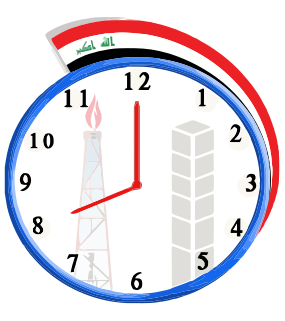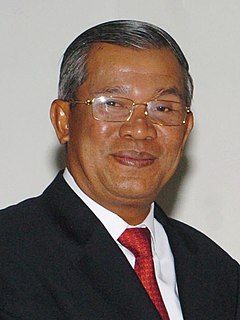The Democratic Left Alliance was a social-democratic political party in Poland. It was formed in 1991 as an electoral alliance of centre-left parties, and became a single party on 15 April 1999. It was the major coalition party in Poland between 1993 and 1997, and between 2001 and 2005, from which came two Prime ministers, Aleksander Kwaśniewski and Leszek Miller. It then faded into opposition, shadowed by the rise of Civic Platform and Law and Justice.

The National United Front for an Independent, Neutral, Peaceful and Cooperative Cambodia is a royalist political party in Cambodia. Founded in 1981 by Norodom Sihanouk, it began as a resistance movement against the People's Republic of Kampuchea (PRK) government. In 1982, it formed a resistance pact with the Coalition Government of Democratic Kampuchea (CGDK), together with the Khmer People's National Liberation Front (KPNLF) and the Khmer Rouge. It became a political party in 1992.

The National Front was the coalition of parties which headed the re-established Czechoslovakia from 1945 to 1948. During the Communist era in Czechoslovakia (1948–1989) it was the vehicle for control of all political and social activity by the Communist Party of Czechoslovakia (KSČ). It was also known in English as the National Front of Czechs and Slovaks.
The Our Ukraine–People's Self-Defense Bloc was an electoral alliance active in Ukraine from 2001 until 2012, associated with former President Viktor Yushchenko. Since 2005, the bloc had been dominated by a core consisting of the People's Union "Our Ukraine" party and five smaller partner parties. On 17 November 2011, the Ukrainian Parliament approved an election law that banned the participation of blocs of political parties in parliamentary elections. Since then several members of the Bloc have since merged with other parties.
The Yulia Tymoshenko Bloc was the name of the bloc of political parties in Ukraine led by Yulia Tymoshenko since 2001. In November 2011, the participation of blocs of political parties in parliamentary elections was banned. The core party of the alliance, Fatherland, remained a major force in Ukrainian politics.

The National Iraqi Alliance, also known as the Watani List, is an Iraqi electoral coalition that contested the 2010 Iraqi legislative election. The Alliance is mainly composed of Shi'a Islamist parties. The alliance was created by the Supreme Council for Islamic Revolution in Iraq to contest in the January 2005 and December 2005 under the name United Iraqi Alliance, when it included all Iraq's major Shi'a parties. The United Iraqi Alliance won both those of elections however later fell apart after several major parties left the alliance due to disputes with Prime Minister Nouri al-Maliki and the Supreme Council.
The Cartel of the Left was the name of the governmental alliance between the Radical-Socialist Party, the socialist French Section of the Workers' International (SFIO), and other smaller left-republican parties that formed on two occasions in 1924 to 1926 and in 1932 to 1933. The Cartel des gauches twice won general elections, in 1924 and in 1932. The first Cartel was led by Radical-Socialist Édouard Herriot, but the second was weakened by parliamentary instability and was without one clear leader. Following the 6 February 1934 crisis, President of the Council Édouard Daladier had to resign, and a new Union Nationale coalition, led by the right-wing Radical Gaston Doumergue, took power.

The Ukrainian parliamentary election took place on 26 March 2006. Election campaigning officially began on 7 July 2005. Between November 26 and 31 December 2005 party lists of candidates were formed.

The National Assembly of Armenia, also informally referred to as the Parliament of Armenia is the legislative branch of the government of Armenia.
Fwon Lespwa was a Haitian political coalition headed by René Préval, who served as president from 1996 to 2001 and from 2006 to 2011. The name Lespwa is the Haitian Creole form of the French l'espoir, meaning "hope". The coalition's full French name is Front de l'Espoir. Lespwa includes many members and former members of the last democratically elected government of Jean Bertrand Aristide and his Fanmi Lavalas.

The Christian Democratic Union is a political party in Ukraine. On December 2, 2002, in Athens, Greece the party became a member of Centrist Democrat International. It is negotiated now its associated membership in the European People's Party. The party also publishes a newspaper called Християнський демократ.
The Democratic Alliance, originally called Democratic Republican Alliance, was a French political party created in 1901 by followers of Léon Gambetta such as Raymond Poincaré, who would be president of the Council in the 1920s. The party was originally formed as a centre-left gathering of moderate liberals, independent Radicals who rejected the new left-leaning Radical-Socialist Party, and Opportunist Republicans, situated at the political centre and to the right of the newly-formed Radical-Socialist Party. However, after World War I and the parliamentary disappearance of monarchists and Bonapartists it quickly became the main centre-right party of the Third Republic. It was part of the National Bloc right-wing coalition which won the elections after the end of the war. The ARD successively took the name Parti Républicain Démocratique and then Parti Républicain Démocratique et Social before becoming again the AD.

General elections were held in Cambodia on 27 July 2008. The result was a victory for the ruling Cambodian People's Party, which won 90 of the 123 seats.
The Cooperative Action to Build Haiti is a political party in Haiti. The party was formerly led by Evans Lescouflair, followed by Carlo Clement and then Jean Williams Jeanty as Secretary-General.

Robert Manuel is a Haitian political figure who was an unsuccessful nominee to the post of Prime Minister of Haiti in 2008.

The State of Law Coalition also known as Rule of Law Coalition is an Iraqi political coalition formed for the 2009 Iraqi governorate elections by the Prime Minister of Iraq at the time, Nouri al-Maliki, of the Islamic Dawa Party.

The second Tymoshenko Government was appointed on 18 December 2007 as a coalition between Bloc of Yulia Tymoshenko (BYuT) and Our Ukraine-People's Self-Defense Bloc (OU-PSD), OU-PSD is the party of then-President of Ukraine Viktor Yushchenko, following the 2007 Ukrainian parliamentary election. The government program was named: "Ukrainian breakthrough: for people, not for politicians".

The Free Egyptians Party is an Egyptian liberal party, founded after the 2011 Egyptian revolution. It supports the principles of a liberal, democratic, and secular political order in Egypt. The Free Egyptians Party was the largest party in the House of Representatives. The party is a founding member of Al Hurriya Liberal Network.
The first Azarov government was Ukraine's cabinet from March 2010 until December 2012, when the second Azarov government was appointed by president Viktor Yanukovych.










